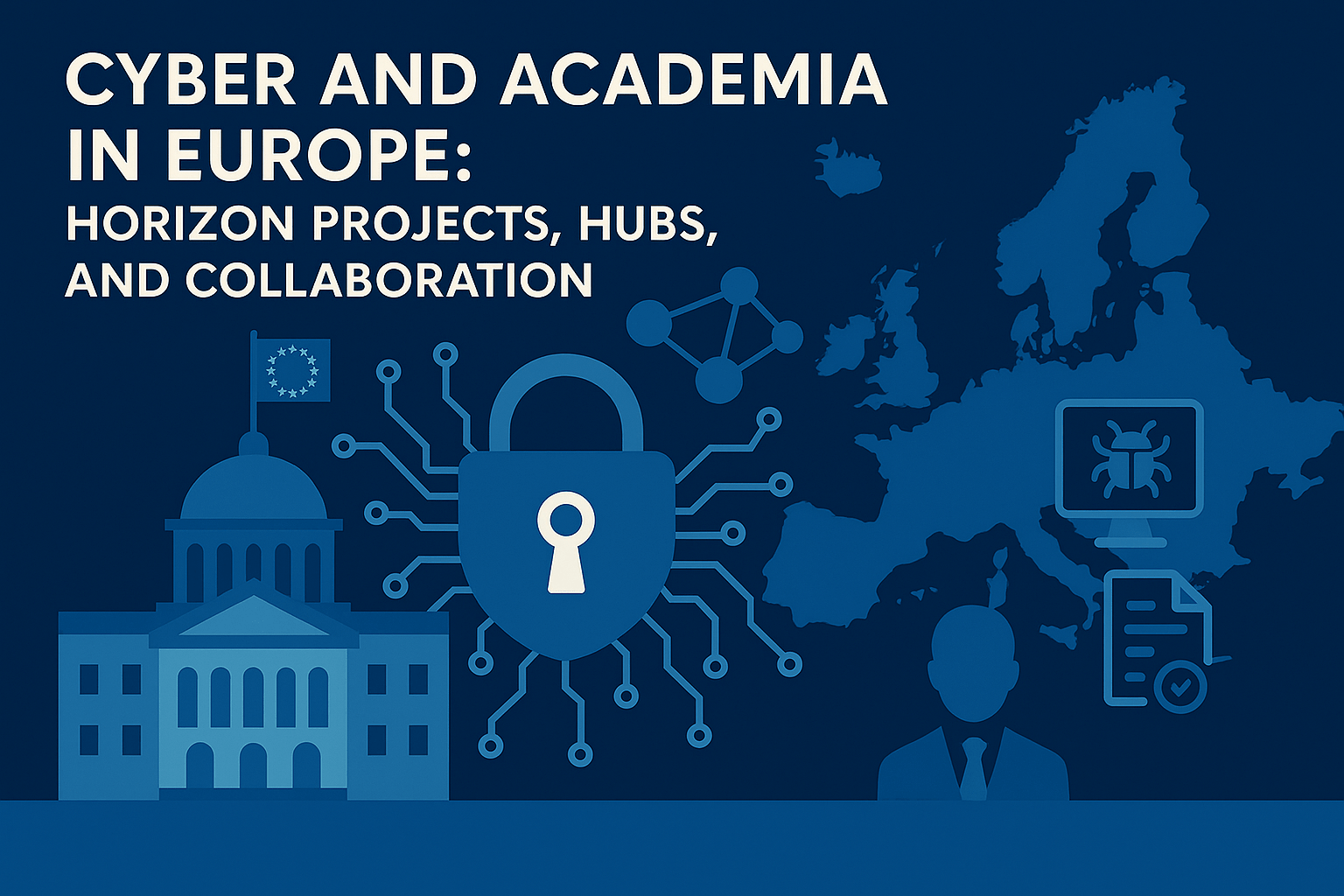Europe’s cybersecurity academic landscape is distributed, multi-lingual, and deeply integrated into public policy and industrial ecosystems. With powerful funding mechanisms like Horizon Europe, a strong regulatory backdrop (e.g. NIS2, Cyber Resilience Act), and a rising number of EU-funded collaborative hubs, academia in Europe isn’t just producing talent and research, it’s driving long-term cyber resilience at national and EU levels.
How universities across the EU are driving cybersecurity innovation, standards, and strategic resilience.
This article maps the key research institutions, EU programmes, cross-border collaborations, and spinouts making European academic cybersecurity world-class.
Contents
- Contents
- 1. EU-Funded Cybersecurity Research via Horizon Europe
- 2. Key Academic Institutions Leading Cyber Research in Europe
- 3. Cybersecurity Competence Centres and Hubs
- 4. Cyber Spinouts and Academic-Industry Successes
- 5. Industry-Academia Collaboration Models
- 6. European Academic Influencers and Research Networks
- 7. How to Engage With EU Academic Cyber Communities
- Final Thoughts
- References
1. EU-Funded Cybersecurity Research via Horizon Europe
Horizon Europe (2021–2027)
- Budget: €95.5 billion across all sectors
- Cybersecurity Focus Areas:
- AI and cyber convergence
- Privacy-preserving technologies
- Post-quantum cryptography
- Threat detection and security-by-design
- How it works: Academic consortia apply for multi-country, collaborative projects with industry partners. Calls are coordinated via the Funding & Tenders Portal
Example Projects:
- SPARTA – Cybersecurity competence network across 14 EU countries.
- CONCORDIA – Builds threat intelligence and training pipelines.
- CyberSec4Europe – Develops harmonised cybersecurity capabilities across academia and industry.
Why it matters: These projects shape certification, policy alignment, and R&D priorities across member states.
2. Key Academic Institutions Leading Cyber Research in Europe
Germany
- CISPA Helmholtz Center for Information Security – Saarbrücken
- Focus: AI security, formal verification, post-quantum crypto
- Fraunhofer AISEC – Munich
- Focus: Embedded systems, automotive cyber, industrial security
France
- INRIA – National research institute for digital science and cyber
- Télécom Paris / Institut Mines-Télécom – Specialises in secure networks and systems engineering
- CNRS-affiliated labs – Participate in dozens of Horizon-funded cyber programmes
Netherlands
- TU Delft & University of Twente – Network security, privacy engineering
- Delft Cyber Security Group – Actively engages in EU policy testing and cryptographic research
Belgium
- KU Leuven – COSIC Group
- World leader in applied cryptography and hardware security
- Université catholique de Louvain (UCLouvain) – Cyber law and ethics
Italy
- Politecnico di Milano – Strong in secure software engineering and SCADA systems
- Sapienza University of Rome – Forensics, privacy, and critical infrastructure protection
Scandinavia
- KTH Royal Institute of Technology (Sweden) – IoT and embedded systems security
- Norwegian University of Science and Technology (NTNU) – Maritime and energy cyber resilience
- Aalto University (Finland) – Usable security and post-quantum systems
3. Cybersecurity Competence Centres and Hubs
European Cybersecurity Competence Centre (ECCC) – Bucharest
- Coordinates EU cyber R&I funding
- Works with National Coordination Centres across all EU states
- Builds an integrated research and innovation ecosystem for cybersecurity
National Coordination Centres (NCCs)
Each EU country hosts an NCC, typically affiliated with a university, government RTO, or national lab. They:
- Help distribute EU cyber funds
- Support local SMEs and universities
- Liaise with ECCC and industry
Why it matters: These centres anchor EU cyber strategy in local research, talent, and industry needs.
4. Cyber Spinouts and Academic-Industry Successes
European universities have generated a number of important cyber spinouts and platforms:
- QuTech (TU Delft) – Quantum security and networking
- Wallix (France) – Access control and identity management (Euronext listed)
- Cryptomathic (Denmark/UK) – Commercial cryptography
- F-Secure (Finland, now WithSecure) – Endpoint protection with strong academic origins
- Edgeless Systems (Germany) – Confidential computing, spun from CISPA research
5. Industry-Academia Collaboration Models
Common European formats include:
- Living labs – Applied testing environments (e.g. Luxembourg Cyber Range)
- Joint doctoral schools – Academic + industry training programmes
- European Institute of Innovation & Technology (EIT Digital) – Cross-border cyber ventures
- Public-Private Partnerships (PPPs) – With funding via Digital Europe or Connecting Europe Facility
6. European Academic Influencers and Research Networks
Some leading voices and groups shaping the EU’s cybersecurity agenda:
- Bart Preneel (KU Leuven) – Cryptography, standardisation
- Jean-Pierre Hubaux (EPFL) – Privacy in health and AI systems
- Jan Camenisch (DFINITY, formerly IBM Zurich) – Secure computation, eID systems
- Women4Cyber (EU-wide network) – Bridging academic, policy, and industry perspectives
7. How to Engage With EU Academic Cyber Communities
- Join a Horizon Europe bid – Partner with universities already leading large consortia
- Sponsor or co-supervise PhD candidates – Especially through MSCA (Marie Skłodowska-Curie Actions)
- Attend EU academic conferences:
- ESORICS (European Symposium on Research in Computer Security)
- IFIP SEC (International Conference on ICT Systems Security)
- CPDP (Computers, Privacy and Data Protection)
- Watch for Digital Europe Programme (DEP) funding – Often channelled through academic-led innovation
Final Thoughts
Europe’s academic cyber sector is decentralised but deeply connected. EU universities not only conduct world-class research but also play a key role in regulation, standards, and the development of sovereign digital capabilities.
For companies, governments, and researchers seeking to influence or benefit from European cyber innovation, universities aren’t optional, they are strategic partners.
In Europe, cyber resilience is not just a product of policy. It’s built in the lab, tested in the field, and shaped in the classroom.
References
- Inside the UK Cyber Ecosystem: A Strategic Guide in 26 Parts
- The Insider’s Guide to Influencing Senior Tech and Cybersecurity Leaders in the UK
- Cyber and Academia in Europe: Horizon Projects, Hubs, and Collaboration
- Cyber Across European Governments: Key Bodies, Funding, and Coordination
- Top Cybersecurity Firms and Services Shaping Europe’s Digital Defence
